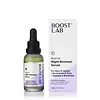What's inside
What's inside
 Key Ingredients
Key Ingredients

 Benefits
Benefits

 Concerns
Concerns

No concerns
 Ingredients Side-by-side
Ingredients Side-by-side

Water
Skin ConditioningPropanediol
SolventCaprylic/Capric Triglyceride
MaskingAloe Barbadensis Leaf Juice
Skin ConditioningGlyceryl Citrate/Lactate/Linoleate/Oleate
EmulsifyingDimethyl Isosorbide
SolventGlycerin
HumectantRetinol
Skin ConditioningTocopheryl Acetate
AntioxidantHydroxypinacolone Retinoate
Skin ConditioningXanthan Gum
EmulsifyingBisabolol
MaskingPolysorbate 20
EmulsifyingTrisodium Ethylenediamine Disuccinate
Citric Acid
BufferingPhenoxyethanol
PreservativeEthylhexylglycerin
Skin ConditioningWater, Propanediol, Caprylic/Capric Triglyceride, Aloe Barbadensis Leaf Juice, Glyceryl Citrate/Lactate/Linoleate/Oleate, Dimethyl Isosorbide, Glycerin, Retinol, Tocopheryl Acetate, Hydroxypinacolone Retinoate, Xanthan Gum, Bisabolol, Polysorbate 20, Trisodium Ethylenediamine Disuccinate, Citric Acid, Phenoxyethanol, Ethylhexylglycerin
Water
Skin ConditioningDimethyl Isosorbide
SolventEthoxydiglycol
HumectantCoco-Caprylate/Caprate
EmollientCaprylic/Capric Triglyceride
MaskingPropanediol
SolventHydroxypinacolone Retinoate
Skin ConditioningTocopheryl Acetate
AntioxidantArachidyl Alcohol
EmollientBehenyl Alcohol
EmollientArachidyl Glucoside
EmulsifyingSodium Hyaluronate
HumectantLysine
Skin ConditioningHistidine
HumectantArginine
MaskingAspartic Acid
MaskingThreonine
Serine
MaskingGlutamic Acid
HumectantProline
Skin ConditioningGlycine
BufferingAlanine
MaskingValine
MaskingMethionine
Skin ConditioningIsoleucine
Skin ConditioningLeucine
Skin ConditioningTyrosine
MaskingPhenylalanine
MaskingCysteine
Antioxidant1,2-Hexanediol
Skin ConditioningPhenoxyethanol
PreservativePullulan
Ethylhexylglycerin
Skin ConditioningXanthan Gum
EmulsifyingHydroxyethylcellulose
Emulsion StabilisingSclerotium Gum
Emulsion StabilisingTrisodium Ethylenediamine Disuccinate
Lecithin
EmollientWater, Dimethyl Isosorbide, Ethoxydiglycol, Coco-Caprylate/Caprate, Caprylic/Capric Triglyceride, Propanediol, Hydroxypinacolone Retinoate, Tocopheryl Acetate, Arachidyl Alcohol, Behenyl Alcohol, Arachidyl Glucoside, Sodium Hyaluronate, Lysine, Histidine, Arginine, Aspartic Acid, Threonine, Serine, Glutamic Acid, Proline, Glycine, Alanine, Valine, Methionine, Isoleucine, Leucine, Tyrosine, Phenylalanine, Cysteine, 1,2-Hexanediol, Phenoxyethanol, Pullulan, Ethylhexylglycerin, Xanthan Gum, Hydroxyethylcellulose, Sclerotium Gum, Trisodium Ethylenediamine Disuccinate, Lecithin
 Reviews
Reviews

Ingredients Explained
These ingredients are found in both products.
Ingredients higher up in an ingredient list are typically present in a larger amount.
This ingredient is an emollient, solvent, and texture enhancer. It is considered a skin-softener by helping the skin prevent moisture loss.
It helps thicken a product's formula and makes it easier to spread by dissolving clumping compounds.
Caprylic Triglyceride is made by combining glycerin with coconut oil, forming a clear liquid.
While there is an assumption Caprylic Triglyceride can clog pores due to it being derived from coconut oil, there is no research supporting this.
Learn more about Caprylic/Capric TriglycerideDimethyl Isosorbide is a low-irritation solvent that helps deliver actives into your skin. It is created from glucose.
Research shows how well this ingredient works depends on the active and formulation rather than the concentration alone. This means adding more Dimethyl Isosorbide does not guarantee better penetration of ingredients into the skin.
Ethylhexylglycerin (we can't pronounce this either) is commonly used as a preservative and skin softener. It is derived from glyceryl.
You might see Ethylhexylglycerin often paired with other preservatives such as phenoxyethanol. Ethylhexylglycerin has been found to increase the effectiveness of these other preservatives.
This ingredient is a retinoid. It usually goes by a more common name: "Granactive".
Hydroxypinacolone Retinoate (HPR) belongs to the class of retinoids that also includes retinol and tretinoin.
Retinoids have been proven to:
So what is the difference between all the retinoids?
Most retinoids need to go through a conversion line to become effective on skin. The ending product is retinoic acid. Retinoic acid is AKA tretinoin.
HPR is an ester of tretinoin. Emerging studies suggest HPR to have an added benefit that other retinoids don't have: Low irritation.
A study from 2021 found HPR to have the greatest stability when exposed to light and temperature out of all the commercial retinoids.
A note about naming:
The name "Granactive" is the trade name and the name most commonly used on packages.
Granactive is the name of the mixture - about 90% solvent and 10% HPR. A product with 5% granactive has 0.5% HPR.
Learn more about Hydroxypinacolone RetinoatePhenoxyethanol is a preservative that has germicide, antimicrobial, and aromatic properties. Studies show that phenoxyethanol can prevent microbial growth. By itself, it has a scent that is similar to that of a rose.
It's often used in formulations along with Caprylyl Glycol to preserve the shelf life of products.
Propanediol is an all-star ingredient. It softens, hydrates, and smooths the skin.
It’s often used to:
Propanediol is not likely to cause sensitivity and considered safe to use. It is derived from corn or petroleum with a clear color and no scent.
Learn more about PropanediolTocopheryl Acetate is AKA Vitamin E. It is an antioxidant and protects your skin from free radicals. Free radicals damage the skin by breaking down collagen.
One study found using Tocopheryl Acetate with Vitamin C decreased the number of sunburned cells.
Tocopheryl Acetate is commonly found in both skincare and dietary supplements.
Learn more about Tocopheryl AcetateTrisodium Ethylenediamine Disuccinate is used to help stabilize a product.
It is a chelating agent, meaning it helps prevent metal ions from binding to other ingredients. This prevents unwanted reactions in products. Metal ions can come into a product via the water ingredient. They are found in trace amounts and are not known to be harmful.
Water. It's the most common cosmetic ingredient of all. You'll usually see it at the top of ingredient lists, meaning that it makes up the largest part of the product.
So why is it so popular? Water most often acts as a solvent - this means that it helps dissolve other ingredients into the formulation.
You'll also recognize water as that liquid we all need to stay alive. If you see this, drink a glass of water. Stay hydrated!
Learn more about WaterXanthan gum is used as a stabilizer and thickener within cosmetic products. It helps give products a sticky, thick feeling - preventing them from being too runny.
On the technical side of things, xanthan gum is a polysaccharide - a combination consisting of multiple sugar molecules bonded together.
Xanthan gum is a pretty common and great ingredient. It is a natural, non-toxic, non-irritating ingredient that is also commonly used in food products.
Learn more about Xanthan Gum